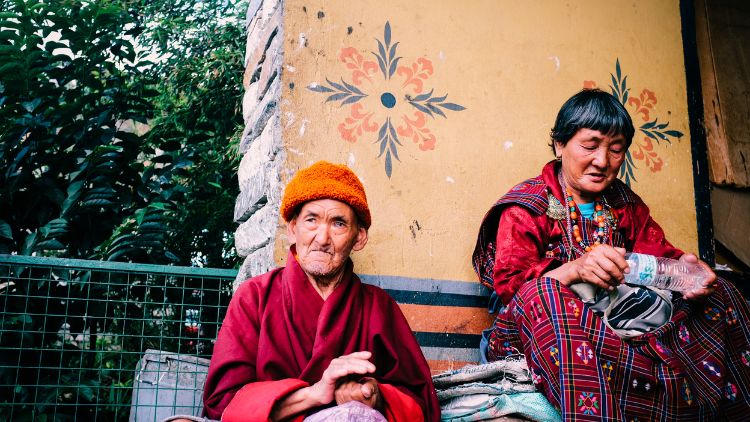Bhutan's Democratic Transition
A critical examination of the political parties of Bhutan in the light of its socio-political backdrop

A man in Red Robe Sitting beside a Green Metal Fence
© By Minh N from PexelsBhutan, a small Himalayan kingdom nestled between India and China, has its own socio-political history, often distinct from other nation-states in its socio-political features, choice of nationality, politics, and governance. While Bhutan had long maintained its isolation from external socio-political and economic influences, it couldn't escape the impact of global socio-political changes, challenges, and pressures in recent times. In fact, its own historical socio-political upheavals challenged it the most. Even the overarching narrative of Gross National Happiness (GNH) and the widely accepted tale of Bhutan's peaceful shift to a constitutional monarchy under wise leaders in 2008 couldn't overlook the fact that socio-political realities drove these political changes. A century-old monarchy observes a series of socio-political and economic structural transformations. The establishments of Dratshangs and Dzongs Monastic educational institutions, the National Assembly, Council of Ministers, legal systems, land reforms, District Development Committees, and Block Development Committees—to name just a few—are some of the major changes that were made under the supervision of the Bhutanese kings. However, along the way, Bhutan also seriously faced socio-cultural and political challenges from various classes and ethnic groups emerging from various regions within and outside the country. Political parties like the Bhutan Democratic Socialist Party (1990), Bhutan National Congress Party (1994), Communist Party of Bhutan (2001), and many others did exist in some form irrespective of their intentions, goals, and the consequences that led through. The need for an inclusive constitution and political changes was realized by the monarchy even before 2008 when Bhutan made a historical move to a constitutional monarchy, holding its first-ever democratic election with 47 seats in its Assembly.
For the people of Bhutan, the national election of 2008 was more than just a political event of parties, elections, and winning and losing. It was seen as a symbol of hope, an inclusive platform for equal access to opportunities, and a mechanism that would help them address the cycle of decades-old issues related to census, ethnic identity, unemployment, economy, education, and so forth. In 2008, Jigme Y. Thinley-led party, the Druk Phuensum Tshogpa (DPT), won against the People’s Democratic Party (PDP), led by party leader Sangay Ngedup, with 45 seats out of the 47 seats in the National Assembly. Both parties were formed in 2007 and had similar parent ideologies of Royalism. In the second round of elections in 2013, the PDP formed the government with 32 seats, and DPT was in the opposition. In the third election in 2018, Druk Nyamrup Tshogpa, led by Dr. Lotay Tshering (since 2013), won a majority in the National Assembly by garnering 30 seats, defeating the two former ruling parties and its new opponents, Druk Chirwang Tshogpa and Druk Kuen Nyam Party that were founded in the same period as the party of Dr. Lotay Tshering who went on to become the Prime Minister. For the upcoming 2023–24 National Assembly election, two more parties, namely, Druk Thuendrel Tshogpa (DTT) led by Kinga Tshering and Bhutan Tendrel Party (BTP) led by Pema Chewang, have registered to contest along with the three former ruling parties. What drives the people’s minds and who will form the government for the next five years will depend on a large number of factors, such as the population size of the different zones and regions, the royal influence in some form, class and socio-cultural symbols and ties, the management of social media and network of information, the agendas and the strategies of the parties that are used to influence the masses, etc. If we look at the previous three elections, it is already proven that no party has made a comeback to power. The politics in Bhutan is dynamic. The sustenance of a political party and its success mostly depend on the delivery of essential services to the people. If not, then even the best political ideology remains just a story in the abstract. The standing of the party can be ascertained more accurately only after the primary round of the election.
Until now, nothing is clear and predictable because Bhutan’s election system, the Election Commission (unlike most countries in the world), does not directly allow religious or socio-cultural institutions/situations/personalities to influence the political parties to drive their interest. However, considering the present scenario of Bhutan, such as the mass exodus of the citizens to Australia, Canada, and Middle East countries, an increase in the unemployment rate, domestic violence, drug abuse, nepotism, corruption, inflation, etc., it feels like it speaks a lot about DNT's governance and also of that of the other former ruling parties. Taking into consideration the recent steps taken by the government regarding inbound tourists with a policy of charging a very high fee in the name of sustainable development, low investments in social sciences research, the high cost of living, lack of space and mechanism to deal with public grievances and freedom of expression, and the huge exaggerations of Bhutan’s socio-political and economic realities on the positive side we can see that the path has rather narrowed for both Bhutanese and non-Bhutanese who have examined the country closely. The new parties, DTT and BTP, seem to have lost their path already halfway through because till now both the parties have not seriously framed an agenda based on the aforementioned issues on various grounds. If no clearer agendas and explanations come from BTP and DTT, it is probable that PDP could form the government. Comparatively, the PDP has better socio-economic and political agendas, and also comparatively better candidates. It seems to have better networking with the public, royals, and bureaucrats. However, the public will place their faith in the one who seriously rethinks the present scenario of Bhutan, its youth, higher educational institutions, census, liberalization of economic sectors, and various other aspects on socio-cultural and political grounds.
